The 50th Session of the Human Rights Council
13 June – 8 July 2022
Item 2 – Interactive Dialogue with COI on the Occupied Palestinian Territory, including East Jerusalem and in Israel
13 June 2022
By Yasmine Darwish and Danya Al-Thani / GICJ
Executive summary
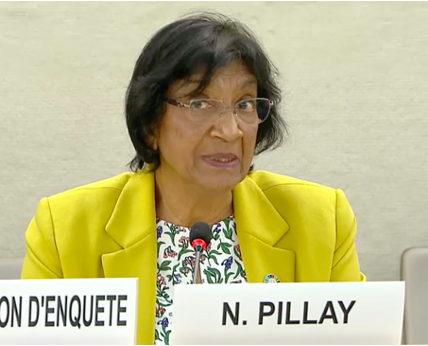
On June 13th 2022, the Human Rights Council established an Independent International Commission of Inquiry (COI) to investigate all allegations of violations of international humanitarian law (IHL) in the OPT. The COI assessed the implementation of recommendations from previous United Nations fact-finding missions and commissions of inquiry on the situation.
It found that “the key findings and recommendations linked to the underlying root causes of recurrent tensions, instability and protraction of conflict have not been implemented. Hence, there is a lack of implementation at the heart of the systematic recurrence of violations of Palestinian rights in the OPT".
The UN Human Rights Council (HRC) mandated the Commission on 27 May 2021 to “investigate, in the Occupied Palestinian Territory, including East Jerusalem, and in Israel, all alleged violations of IHL and all alleged violations and abuses of international human rights law leading up and since 13 April 2021”. Furthermore, the COI commanded to “investigate all underlying root causes of recurrent tensions, instability, and protraction of conflict, including systematic discrimination and repression based on national, ethnic, racial or religious identity.” As the chair, Navanethem Pillay was appointed to lead the Commission, while Miloon Kothari and Christopher Sidoti were appointed to serve as members.
The COI highlighted “Israel’s failure to uphold the laws and customs of war, including those of belligerent occupation, violations and abuses of individual and collective rights, and a lack of accountability”. Despite Israel’s refusal to cooperate with the commission and denying entry into the country, Ms Pillay said “the occupation must end now; all persons in Palestine and Israel must be afforded all their human rights, without discrimination, including their right to live in peace and security alongside their neighbours.” She further urged “the international community [to] adhere to its international obligations to ensure full respect for international law in Israel and the Occupied Palestinian Territory, and work towards ensuring that those responsible for international crimes are held to account.”
Geneva International Centre for Justice (GICJ) supports the work of the COI and regrets the lack of progress made in the conduct of domestic investigations contributing to the denial of access to justice for Palestinian victims and of their right to an effective judicial remedy. The international community must ensure that all law enforcement agencies comply with international human rights standards as well as impartial investigations are made into all deaths and injuries to identify the culprits and bring them to trial. Justice and accountability for the attacks against the Palestinian people must be held as well as guarantee to adequate compensation to the families of all victims and medical assistance to all injured people.
Background
Israel's 55-year-long occupation is now indistinguishable from apartheid practices. The occupying power’s laws and policies are designed to maintain a cruel system of control over the Palestinians. The Israeli system is based on institutional discrimination against the Palestinian people leaving them geographically and politically fragmented, often impoverished, and in a constant state of fear and insecurity - equating to apartheid. This system of oppression and domination against Palestinians across all areas under Israel’s control aims to benefit Jewish Israelis.
Israel's political leaders seek to maintain their control over the entire occupied territory through the establishment of settlements in the occupied Palestinian territory, in violation of international law, where 700,000 Israeli Jewish settlers live with full legal and political citizenship rights amidst five million stateless and rightless Palestinian people. Israel's plans are unequivocal: to have more Jewish settlers and Jewish settlements on larger parcels of occupied land. Consequently, expropriate more Palestinian property and use harsher and more sophisticated methods of population control. Their goal is to confine the Palestinians to barricaded population reserves.
Israeli forces have repeatedly violated their obligations under international human rights law by using excessive force, resulting in unlawful killings and injuries to civilians, including children. They have been permitted to do so with virtual impunity due, in no small part, to the authorities’ failure to conduct thorough, impartial, and independent investigations. Such arbitrary and abusive use of force contravenes policing standards that protect the right to life and other human rights, and they also violate IHL, applicable in territories under foreign military occupation, including the West Bank.
Presentation of the report
The report, presented to the 50th session of the Human Rights Council on 13 June 2022, criticised Israel for perpetuating cycles of violence against Palestinians and attempting to seize complete control of Palestinian territory. It laid out the Commission’s investigations and legal analysis into alleged violations and abuses, and worked with judicial accountability mechanisms toward ensuring individual, State and corporate accountability. It took a deep look into “all alleged violations of IHL and all alleged violations and abuses of international human rights law leading up since 13 April 2021”.
The Commission further reviewed the findings and status of implementation of recommendations of previous UN fact-finding missions and commissions of inquiry on the situation and of other UN human rights bodies. It found that “the key findings and recommendations linked to the underlying root causes of recurrent tensions, instability and protraction of conflict have not been implemented. This lack of implementation is at the heart of the systematic recurrence of violations in both the Occupied Palestinian Territory, including East Jerusalem, and Israel”.
The Commission identified that the recommendations have “overwhelmingly not been implemented, including calls to ensure accountability for Israel’s violations of international humanitarian and human rights law as well as the indiscriminate firing of rockets fire by Palestinian armed groups into Israel. The lack of implementation, coupled with the sense of impunity, is a clear indication that Israel has no intention of ending its occupation. As a result of the systematic recurrence of violations in the Occupied Palestinian Territory, including East Jerusalem and Israel, there is persistent discrimination against Palestinians.
According to the report, Israel clearly has no intention of ending the occupation. In fact, it has established clear policies to ensure complete and permanent control over the OPT and therefore fuel the cycle of violence.
Interactive dialogue
After the presentation of the COI’s report, the President opened the floor to the States concerned. Israel did not attend.
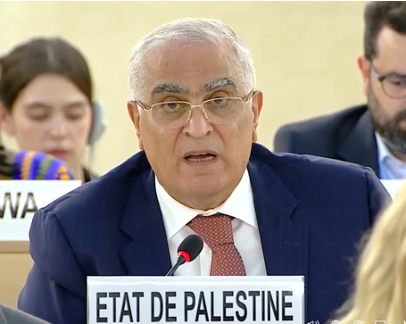 During the discussion, the delegation of Palestine lamented the lack of accountability for the demolition of houses, hospitals, and the constant targeting of civilians by Israeli forces. The delegate asked for practical recommendations to hold Israel accountable. He stressed that discrimination against Palestinians in the West Bank and East Jerusalem, forced displacement, demolitions, settlement expansion, settler violence, and the blockade of Gaza have all contributed to and will continue to contribute to the cycle of violence.
During the discussion, the delegation of Palestine lamented the lack of accountability for the demolition of houses, hospitals, and the constant targeting of civilians by Israeli forces. The delegate asked for practical recommendations to hold Israel accountable. He stressed that discrimination against Palestinians in the West Bank and East Jerusalem, forced displacement, demolitions, settlement expansion, settler violence, and the blockade of Gaza have all contributed to and will continue to contribute to the cycle of violence.
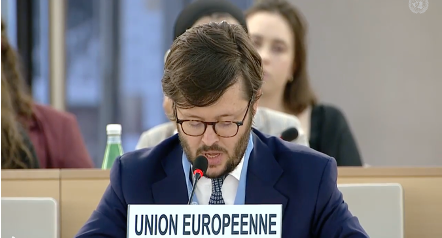 The European Union (EU) representative highlighted that some member states were opposed to the establishment of the commission of inquiry (COI). However, they stressed that the EU was deeply concerned about the repeating cycles of violence in the OPT and Israel and called upon all parties to exercise maximum restraint. Specifically, they called for maintaining the status quo on the Temple Mount / Haram al-Sharif. Labelling the situation in Gaza as “of great concern”. Additionally, they expressed sympathy for Israel’s security concerns while calling for an end to the closure of Gaza. The EU condemned all violence, including attacks by Hamas and terrorist groups, and called on all groups to uphold human rights and investigate alleged violations. They also emphasised the importance of the unhindered work of the media and civil society, including journalists and human rights defenders. The EU acknowledged that Israeli settler activities in the OPT and East Jerusalem are illegal under international law.
The European Union (EU) representative highlighted that some member states were opposed to the establishment of the commission of inquiry (COI). However, they stressed that the EU was deeply concerned about the repeating cycles of violence in the OPT and Israel and called upon all parties to exercise maximum restraint. Specifically, they called for maintaining the status quo on the Temple Mount / Haram al-Sharif. Labelling the situation in Gaza as “of great concern”. Additionally, they expressed sympathy for Israel’s security concerns while calling for an end to the closure of Gaza. The EU condemned all violence, including attacks by Hamas and terrorist groups, and called on all groups to uphold human rights and investigate alleged violations. They also emphasised the importance of the unhindered work of the media and civil society, including journalists and human rights defenders. The EU acknowledged that Israeli settler activities in the OPT and East Jerusalem are illegal under international law.
The representative from Saudi Arabia on behalf of the Gulf Cooperation Council affirmed their opinion that Israel is an occupying power and highlighted how Israel is not willing to implement any recommendations, ignoring both international organisations and the UN charter. They affirmed their support of the Palestinian people and condemned their forced displacement due to settler activities. They urged the international community to investigate crimes against the Palestinian people to allow the peace process to continue, leading to the establishment of an independent Palestinian state within the 1967 borders, with East Jerusalem as its capital.
The representative of Pakistan on behalf of the Organisation of Islamic Cooperation (OIC) strongly regretted the lack of cooperation from Israel with the commission and all UN mechanisms. IC strongly condemns the attacks and disinformation designed to delegitimise the work of the commission. They termed the situation in the OPT an Apartheid regime. Furthermore, they urged the international community to hold Israel accountable for violations of international law and support the establishment of an independent Palestinian state.
The representative of Jordan on behalf of other Arab states also expressed concern about Israel’s lack of cooperation with the commission. They expressed support for the work of the commission, condemned actions against it, and reiterated that they are looking forward to the next report.
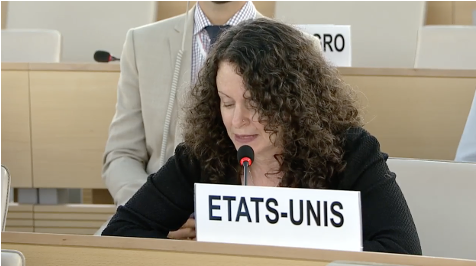 The representative of the United States of America spoke on behalf of 22 Countries. They expressed concern over the establishment of an open-ended COI. Also, stressed their belief that the nature of the COI is indicative of a long-standing and disproportionate scrutiny applied to Israel by the HRC and could lead to larger polarisation of the issues. Hence, the delegation urged the HRC to address all human rights concerns regardless of country.
The representative of the United States of America spoke on behalf of 22 Countries. They expressed concern over the establishment of an open-ended COI. Also, stressed their belief that the nature of the COI is indicative of a long-standing and disproportionate scrutiny applied to Israel by the HRC and could lead to larger polarisation of the issues. Hence, the delegation urged the HRC to address all human rights concerns regardless of country.
Speaking on behalf of 61 countries, the representative of Pakistan, expressed serious concerns over attempts to undermine the work of the COI and urged the council to reject any attempts to question the council’s authority. They endorsed the COI’s work to identify the root sources of recurrent tensions of the conflict and the violations of human rights law in the OPT, including East Jerusalem. Lastly, Pakistan agreed with the council, that ending the occupation was essential to end the cycle of violence and affirmed their support for self-determinism of the Palestinian people.
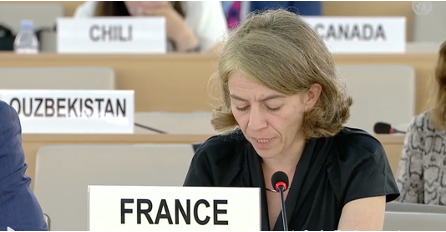 The representative of France termed the mandate for the commission too broad and its objectives are not fully determined. France showed concern over the deterioration of the situation and recent violence in Jerusalem, including the shocking death of the journalist Shireen Abu Aqleh. Although the representative affirmed that France will not contradict Israeli security concerns, they called for the end to the eviction of Palestinian families and the colonisation of Palestinian Territories. Moreover, they stressed the importance of strong democratic institutions founded on the rule of law for the establishment of any Palestinian state.
The representative of France termed the mandate for the commission too broad and its objectives are not fully determined. France showed concern over the deterioration of the situation and recent violence in Jerusalem, including the shocking death of the journalist Shireen Abu Aqleh. Although the representative affirmed that France will not contradict Israeli security concerns, they called for the end to the eviction of Palestinian families and the colonisation of Palestinian Territories. Moreover, they stressed the importance of strong democratic institutions founded on the rule of law for the establishment of any Palestinian state.
The representative of Qatar regretted that Israel, as an occupying power, refuses to cooperate with the commission. Hence, they called upon Israel to put an end to the violations of international laws and resolutions. The end of violence against the Palestinian population along with the Israeli government’s policy of colonialism, racism and forceful displacement and demolition, was requested. Furthermore, the representative stressed the importance of accountability from Israeli leaders and expressed their support for the rights of Palestinians, especially their right to an independent state with Jerusalem as its capital.
The representative of Cuba expressed concern that the recommendations from previous investigations had not been implemented. They further pledged their solidarity with the struggle of the Palestinian people, supporting their right to a sovereign state under the 1967 borders with East Jerusalem at its capital.
The representative of Libya condemned the continued policies of occupation and the occupying force’s lack of cooperation with the commission. They also condemned the violence, discrimination, and lack of respect for IHL. They urge the commission to investigate abuse and violence committed by Israel to ensure accountability with a view to implementing the rights of the Palestinian people.
The representative of Brunei aligned itself with the statement delivered by Pakistan. They showed their support towards the COI’s mandate and encouraged their important work. After re-emphasising their solidarity with Palestine, they appealed to all member states for full cooperation to resolve this crisis.
The representative of Bangladesh thanked the COI and showed disdain towards Israel’s continuous lack of cooperation with the UN mechanism. Bangladesh strongly condemned all illegal acts by Israel in the OPT, including the expansion of settlements. He agreed with the commission that Israel has no plans to end the occupation, and instead aims to gain complete control over the OPT, contrary to international law. Expressing alarm regarding the culture of impunity, they requested the violators of international law be held accountable. Lastly, he reaffirmed their support for Palestinian self-determination according to the pre-1967 borders and two-state solution.
The representative of Namibia noted that the commission's work not only addresses state and individual responsibility but also corporate responsibility regarding abuses of human rights in the OPT. Namibia expressed their concern by the ongoing violation of the rights of the Palestinian people and sought an end to Israel's illegal and brutal occupation.
The representative of the Russian Federation expressed his concerns about the increase in acts of conflict and violations of human rights, alongside the destruction of infrastructure and the worsening humanitarian situation in the OPT. They supported the demands of Palestine for an unbiased investigation into the death of the journalist Shireen Abu Aqleh. Yet, they conveyed their disappointment for the lack of specific steps aimed at reducing tensions. Hence, to resolve the conflict, Russia emphasised on giving international recognition to a two-state solution.
Position of Geneva International Centre for Justice
Geneva International Centre for Justice (GICJ) supports the work of the COI and deplores Israel’s lack of cooperation with the commission. We strongly condemn violations of human rights and IHL by Israel in the OPT and East Jerusalem. We call on the international community to hold the perpetrators accountable and to put pressure on the occupying forces to bring an end to occupation and to release Palestinians from Apartheid oppression. GICJ urges all relevant actors to comply with international humanitarian and human rights law and the Israeli authorities to cease all illegal settlement activities; this includes altering the de facto border and demolishing Palestinian homes to make way for new settlements. Palestinians have the right to live in dignity and peace, and all states should promote this right. It is important to note that human rights apply to all, not just to the politically powerful parties. We call upon the council to put into action any recommendations made by the COI to work towards bringing peace to the region.
HRC50, Interactive Dialogue, Commission of Inquiry, Palestine, Apartheid, Occupied Palestinian Territory, OPT, Occupying Power, Interactive Dialogue, Human Rights Council, Justice, Human Rights, Geneva, Geneva4justice, GICJ, Geneva International Centre for Justice




